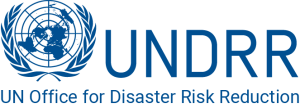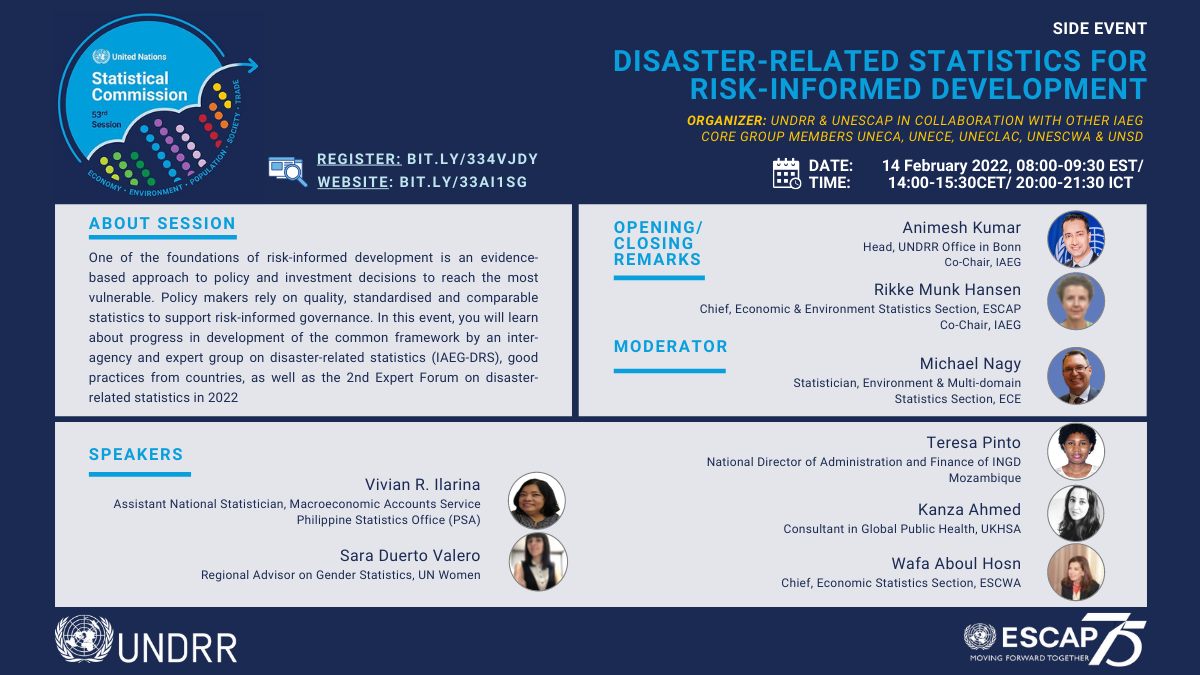Webinar - 14 February 2022, 08:00-09:30 EST (UTC-5) / 14:00-15:30 CET (UTC+1) / 20:00-21:30 ICT (UTC+7)
Check event time for your nearest time
Please register: bit.ly/3glBvet
Meeting link: bit.ly/3oMt93P
Organizers: UNDRR and UNESCAP in collaboration with other IAEG Core Group members UNECA, UNECE, UNECLAC, UNESCWA and UNSD
The adoption of the Sendai Framework for Disaster Risk Reduction 2015-2030 brought for the first time a monitoring framework including seven global targets and 38 indicators for monitoring of the targets. While endorsing these recommendations, the UN General Assembly recommended developing standards for disaster-related data and statistics including with engagement of national disaster risk reduction offices and national statistical offices. Building on existing work in this emerging area, the Statistical Commission at its 50th session established a mechanism to develop a common framework on disaster-related statistics. An inter-agency and expert group (IAEG) began operating in 2021.
One of the foundations of risk-informed development is an evidence-based approach to policy and investment decisions to reach the most vulnerable. Policy makers mostly rely on official statistics, compiled and analysed with empirical rigour in all areas of governance, including disaster risk reduction. Disaster-related statistics provide the required level of quality and standard in data usage, enabling comparison across space and time, and inter-operability between data platforms.
Disaster-related Statistics have gained a strong interest from the national statistical systems. The Disaster-Related Statistics Framework supported by ESCAP, Task Force on Measuring Hazardous Events and Disasters by ECE and the Disaster Risk Reduction Statistics Working Group by ECLAC demonstrate the strengthening of this field in statistics. The structure of the common statistical framework on disaster-related statistics is currently under development. Moreover, the UNECE Task Force on Measuring Hazardous Events and Disasters and the IAEG organized the First Expert Forum on disaster-related statistics in June 2021. UNESCWA will be hosting the second Expert Forum on disaster-related statistics in 2022.
Come and join!
Against this backdrop, this side event will be organized with the following objectives:
- Share progress in development of the common framework on disaster-related statistics
- Share good practices in disaster-related statistics
- Provide a status of the reporting on international agreements through SDG and Sendai Framework monitoring
Agenda
TIME (ICT time) | ACTIVITY | PRESENTER |
20:00 – 20:10 | Welcome Remarks: Introduction and Update on the IAEG process towards a common statistical framework on disaster-related statistics | Animesh Kumar Head, UNDRR Office in Bonn Co-Chair, IAEG |
20:10 – 21:15 | Panel Discussion
(Time allotment: 7 minutes for each panellist plus 7 minutes time introduction and transition)
Open Discussion (30 mins) | Moderator: Michael Nagy, Statistician, Environment and Multi-domain Statistics Section, Statistical Division, United Nations Economic Commission for Europe |
21:15 – 21:20 | Second Expert Forum on disaster-related statistics:
| Wafa Aboul Hosn Chief, Economic Statistics Section, ESCWA |
21:20 – 21:30 | Closing Remarks Announcements/Other information | Rikke Munk Hansen Chief, Economic and Environment Statistics Section, Statistics Division, ESCAP Co-Chair, IAEG |


